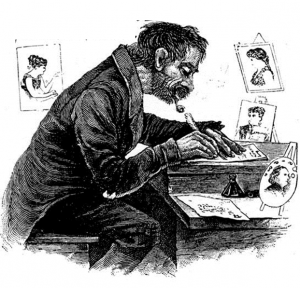 Celebrated American author Raymond Chandler once said: “The faster I write the better my output. If I am going slow, I’m in trouble. It means I’m pushing the words instead of being pulled by them.”
Celebrated American author Raymond Chandler once said: “The faster I write the better my output. If I am going slow, I’m in trouble. It means I’m pushing the words instead of being pulled by them.”
Some have interpreted this to mean you should write without thinking, also known as silencing the so-called “inner editor.” This is a meme borrowed from the cultural contagion known as pop psychology, where the primary obstacle to success is believed to be neither talent nor resources, but lack of confidence.
Another interpretation is that Chandler was talking about writing for speed or word-count, just getting the story down on paper no matter what.
I believe both of these interpretations, and the philosophies behind them, are missing the point. If you’re intentionally blocking your inner editor, or racing to finish X number of words by sundown, you’re still pushing, not pulling.
_
Editing the Deluge
Being pulled by the words is about being inspired.
It’s not a race for speed or a struggle against one’s internal grammar-spell check. Being pulled by the words means an easily competent and naturally energetic pace. It’s like a joyride, a road trip, or a spontaneous chase through the park between lovers. It means writing fast because the story wants to be there, the characters want to do what you’re writing them to do, and the flood-gates of the Creative are wide open.
There’s no “inner editor” who can stand, Canute-like, and hold back the vast waters of genuine inspiration. Blaming the inner editor for holding back the creative tide is like crediting your werewolf repelling charm bracelet for the absence of werewolves in your suburb. Truth is there are no werewolves now because there were no werewolves to begin with.
And, if your inner editor is thwarting your inner muse, that might be cause to divorce that muse and find a stronger one.
_
Labor of Love or Love of Labor
Even worse, too much writing advice these days is quantity-driven: how to sell more, get more readers, publish more, win win win! Writers who announce their daily word-counts like they’re punching an authorial time-card have bought into this quantified vision of art. They push out words merely to meet a daily quota, and when they read Chandler’s advice to write faster, they think this means: “Push harder! Write more!”
A numbers-driven “the faster I write” is not going to lead to “the better my output.” It certainly will produce lots and lots and lots of output, and if quantity is your only measure of “better” then … well … more is better.
But if you think “better” refers to quality of writing, pushing words out faster is not the ticket.
It is true that writers need a good work ethic, but writing is so much more than “the art of applying the seat of the pants to the seat of the chair.” That infectious literary meme is a quote from Mary Heaton Vorse. You know, the Mary Heaton Vorse who is celebrated for the time-honored literary achievement of … ummm … wait, wait, don’t tell me! *scratches head*
Let’s put it this way: Vorse is remembered primarily for receiving the United Auto Workers Social Justice Award for her work as a pro-labor journalist. If that’s where your dreams lie, then by all means feel free to affix your activist pants to the chair of advocacy and pound out mountains of manifestos and talking points.
However, if you want to write fiction (insofar as political writing deviates from fiction), you might want to seek inspiration first and let yourself be pulled by the words.
_
How To Know It’s Inspiration
 How do you distinguish between pushing and pulling? How do you write faster and better? How do you know that you’re working with inspiration and not mere perspiration?*
How do you distinguish between pushing and pulling? How do you write faster and better? How do you know that you’re working with inspiration and not mere perspiration?*
The words should pull you because you’re excited to read them as you write them, because the characters and the setting and the scene are enthralling. It’s the same impulse that draws a reader through a book, the same dynamic that leads a reviewer to describe something as “a page turner” or “un-put-downable.”
If you are genuinely pulled by the words while writing, and not simply pushing for pace or word-count, it is more likely that others will be pulled along while reading. When the story pulls the writer, it will pull the reader as well.
So, find your muse first. When you find the muse, the words will come, and you will not be able to stop them.
_
* Another oft-quoted paean to the work ethic, by Thomas Edison, probably should be edited to read: “Genius is one percent someone else’s inspiration, ninety-nine percent perspiration from racing to patent their idea.”
